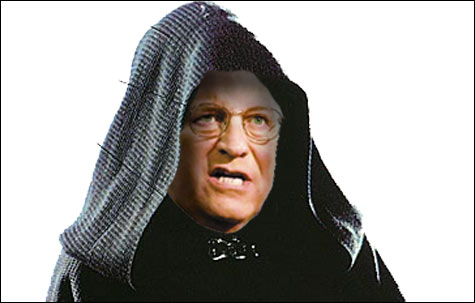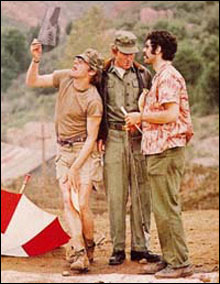
DARTH CHENEY: The vice-president’s manipulation tactics may be cloaked in different robes, but they’re still showing up on the silver screen. |
It’s not likely, but Judd Apatow’s pitch for Knocked Up might have sounded something like this:
Lulled into an involvement that they had been assured would be a quick in-and-out with no complications — a one-night stand rather than a long-term occupation — Americans wake up to discover that they’ve been soundly screwed and are stuck with a costly, unending occupation.
Okay, so the hit comedy, about a slacker and a career woman whose drunken tryst ends in pregnancy, doesn’t, at first glance, bear much resemblance to our ongoing Iraq nightmare. The millions going to see it are looking for laughs, escape, maybe a superficial probing of their own feelings about sex, love, parenthood, and responsibility. But if they probe a little deeper, maybe they’ll also see some unresolved anger about a war that will not end (could the “A” word of abortion, never considered an option, be in fact the “W” of withdrawal?) or anxiety about some future unwanted commitment, such as the draft.
That’s the way popular entertainment works sometimes. You go to a film to get away from your worries, to be entertained, but the fantasies onscreen end up playing with what bugs you most. Like dreams, movies can provide relief, acting out unconfronted anxieties and taboo desires, but when examined, reveal painful truths. Movies, or so might say someone like Siegfried Kracauer, whose From Caligari to Hitler traced the rise of Nazism through the German popular cinema of the 1920s and ’30s, can hold a mirror up to a nation’s subconscious and, in effect, provide a shadow history of the times.
On the other hand, Knocked Up might just be another raunchy sex comedy. If so, then where are the films about the Iraq War, a conflict that has, rightfully, dominated our national conversation (when it hasn’t been preoccupied with topics such as Anna Nicole Smith or Paris Hilton) since at least 2003?
There are the documentaries, of course, which barely register at the box office. And, according to a recent LA Times article, a few features overtly about Iraq are on the way, such as No True Glory: The Battle for Fallujah, starring Harrison Ford as a general, and Nick Broomfield’s Battle for Haditha, a dramatization of the operation that ended with an alleged massacre of Iraqi civilians by American Marines.
That’s not many, after four-plus years. But in a deeper sense, Iraq War movies are everywhere, haunting the images of every film we’ve loved and hated since American boots and missiles first hit the ground. It’s a familiar pattern, one seen four decades ago during our other unpopular, unending war.

PASSIVE AGGRESSIVE PROTEST: Patton, M*A*S*H (pictured), Night of the Living Dead, and The Dirty Dozen all spoke to anxieties about the Vietnam War in a roundabout way. |
Vietnam flashbacks
Say what you will about Hollywood’s foot dragging; at least some Iraq movies are coming out before the war is over. The only feature film about Vietnam to be released while American involvement was still under way was John Wayne’s jingoistic The Green Berets (1968). Movies about the war itself didn’t start coming out until 1978, five years after it had come to an end, with The Deer Hunter, Coming Home, Go Tell the Spartans, and others.And, mind you, this was at the height of the “auteur” regime in Hollywood. Surely rising filmmakers with the talent, ambition, and audacity of Robert Altman and Francis Ford Coppola, or established masters such as Robert Aldrich, must have had something to say about a war that had convulsed every other aspect of American society and culture.